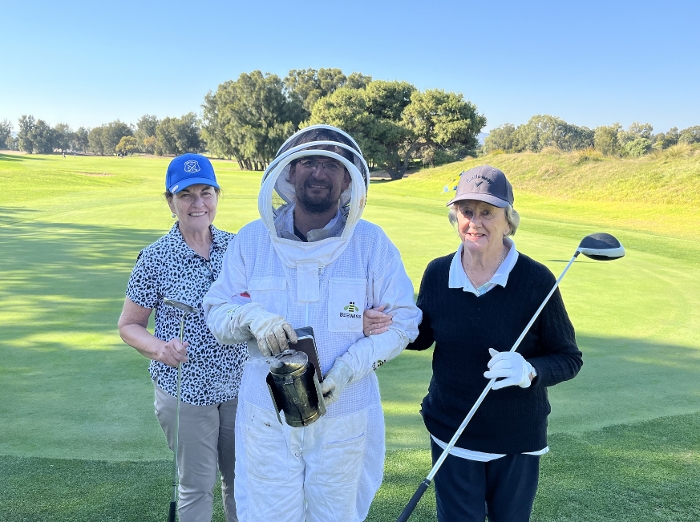

Busy bees and birdies - a match made on the green at West Beach Parks Golf

Busy bees have been making one of Adelaide’s renowned 18-hole golf courses home at West Beach Parks as part of an environmental plan to protect and enhance local biodiversity.
Six bee hives have been installed in West Beach Parks Golf’s Patawalonga Golf Course, at West Beach, in the recently revegetated native trees, bushes and grasses that make up the course.
The bee hives are the first known to have been placed on a golf course in South Australia and West Beach Parks Golf is celebrating the hard work of its tiny, new residents as part of World Bee Day (May 20).
West Beach Parks CEO Kate Anderson said West Beach Parks Golf felt adding bee hives to the course was a natural inclusion following the recent completion of biodiversity works, including removal of non-native trees and plants and replacing them with 31 species of native riparian and coastal flora species.
“The six beehives are safely situated away from the short grass of the greens to ensure our busy bees are foraging and pollinating the 7000 native plants added to the golf course as part of our ongoing Environmental Sustainability Plan to protect and enhance local biodiversity,” said Ms Anderson.
She said the first honey was harvested in April and due to arrive from the beekeepers in coming weeks to be shared among West Beach Parks Golf staff.
Beekeepers Jorg and Sabine Pangerl, directors of Adelaide Bee Sanctuary, said about 50,000 European honeybees (Apis Mellifera) inhabited each of the hives at West Beach Parks Golf, believed to be the first in South Australia with beehives located on the golf course.
“Golf courses, designed with natural habitats and conservation areas that include native plants attractive to bees, can serve as valuable habitats for these pollinators, contributing to their conservation and supporting biodiversity,” said Mr Pangerl.
“While golfers frequent the courses, large areas of a golf course can remain relatively undisturbed, providing a peaceful environment for bees to forage,” he said.
Recent News
- Blog: Let’s get (a)political: all you need to know about elections and public relations
- The world’s most valuable dog toy revealed in the lead up to Guide Dogs Day
- Skytrax names Adelaide as best regional airport in Australia & Pacific region
- Indonesia AirAsia To Touch Down in Adelaide for the first time in June Fares on sale today starting from just AUD$199*!
- ‘Sleep hygiene’ stocktake critical for women in daylight savings change over
- United Airlines welcomed for South Australia’s first ever direct flights to US
- West Beach Trust appoints Elinor Walker to Board
- Local student Emaan Dewanyang wins Yugo Accommodation Support Scholarship with RMIT
- Blog: Why do so many companies fail the pub test in a crisis?
- Congratulations to our graduating and retiring Guide Dogs… and meet our new puppies!
- CH4 Global named one of TIME Magazine’s Top GreenTech Companies
- Flu cases in SA already up by 550 – experts warn get vaxed now
- Adelaide’s first purpose-built, affordable, long-term rental housing for women opens
- The world’s seaweed industry focuses on Adelaide at Seagriculture
- New Mount Barker Residential Development: A Feast for the Senses
- Blog: Be prepared - and be credible
- Visa Cash App Racing Bulls Announces Partnership with the Exclusive Student Housing Marketplace, Student.com
- CH4 Global and Mitsubishi Corporation partner to accelerate adoption of methane-reducing cattle feed supplement in Asia-Pacific markets
- Opinion Editorial by Brenton Cox, Adelaide Airport Managing Director - The Advertiser’s Future SA Campaign
- Adelaide’s most luxurious aged care site opens in an Australian first








